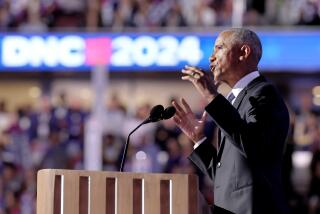Ideas, Not Litmus Tests, Can Lift the Democrats : There’s Nothing Wrong With Liberalism That a Broader Perspective Won’t Cure
In the recriminations that inevitably follow any major political defeat, Michael Dukakis is being blamed for running a strikingly maladroit campaign that belied its only consistent theme: competence.
But it is a mistake to view his defeat in isolation rather than as a continuation of what has now become the longest Democratic losing streak in presidential races since the Civil War. Seen in this context, Dukakis is being made the scapegoat for Democrats’ collective failure to formulate a persuasive political message.
In fact, Dukakis succeeded quite well in turning out the Democratic vote. According to exit polls, he won 83% of self-identified Democrats’ votes, the highest percentage since Lyndon Johnson’s 1964 landslide. His “I’m on your side” message secured--but failed to expand--the Democratic base, which by itself is no longer large enough to win a national election.
Democrats aren’t losing because we have failed to rally our core constituencies. Nor can we blame inept candidates, inferior television advertising or a public that is too obtuse to grasp our message. Let’s have no more alibis: Democrats are losing because we still lack a clear governing philosophy that presents a credible challenge to the reigning Republican agenda for low taxes, national assertion and cultural conservatism.
The task facing Democrats is not to forsake liberalism but rather to reconstruct it as a vibrant force for achieving broad national purposes. That does not mean abandoning any of our constituencies, but it does mean disenthralling the party from a programmatic and ideological orthodoxy that inhibits fresh and creative thinking about how to tackle the nation’s problems.
Over the past two decades the great liberal consensus forged by Franklin Roosevelt has been fractured by war, social and racial conflict, economic change and cultural upheaval. Having overturned the old Democratic Establishment, a new party elite of activists and pressure-group leaders ushered in a new kind of “liberalism” that in certain respects diverges sharply from the popular, mainstream liberalism of the New Deal and the New Frontier.
Whereas the latter pursued broad national goals--upward mobility, civil rights and liberties, and tough-minded opposition to totalitarianism abroad--the more recent strain of “litmus test” or “process” liberalism has tended to define its agenda as the sum of demands made by organized interests. Reflecting its origins in the anti-war movement, the new politics also questioned the moral legitimacy of Democrats’ post-war policy of internationalism. That attitude is what the public recall has in mind when it suspects Democrats of being “weak on defense.”
Too much of what now passes for liberalism is in fact profoundly illiberal in that it seeks special privileges for politically powerful interests and resists changes in a status quo that protects those privileges. As a result, Democrats keep winding up on the wrong side of issues that pit narrow interests against the national interest. For example, the resistance of a powerful teachers’ association to reforms like competency testing and merit pay badly serves our national interest in dramatically improving the quality of education in America. Similarly, the protectionist pressures that are generated by some companies and unions undermine our common interest in making American industries and workers world-class competitors. And banning flight testing of missiles--as certain “peace” groups demand--would undercut both nuclear stability and arms control, since such a ban would prevent the modernization of our deterrent forces.
When it comes to presidential elections, there is simply no substitute for a message that appeals to Americans on the basis of their common interests and patriotism. If Democrats envision the party as the agent of upward mobility for all citizens, we will surely appeal to the poor but aspiring Americans who dream of better lives. But if we conceive our mission as representing only the disinherited, we will offer little to the middle-class voters whom we need if we are to rebuild a durable governing coalition. On national security, if we first assure the American people that Democrats can be trusted with the defense of our nation’s interests abroad, we’ll get the chance to bring about a more rational ordering of military priorities. But if we fail to cross that crucial threshold of trust and credibility on national security, then it won’t matter how good our ideas are, because we won’t win the White House.
Democrats need to move beyond a basically reactionary politics of litmus tests and parochial interests and reinvigorate modern liberalism as a force of common justice in our society. In formulating a new Democratic agenda for governing, our party needs to reclaim the progressive themes of individual freedom, upward mobility, tolerance, equal justice and a robust spirit of citizenship and civic obligation.
Democrats can’t resurrect the New Deal or mindlessly perpetuate its programmatic residue, but we can recapture the venturesome and democratic spirit that is its true legacy. An especially intriguing example is the voluntary national-service plan endorsed by Democrats of such diverse outlooks as Sen. Sam Nunn of Georgia and Sen. Barbara A. Mikulski of Maryland. Like the GI Bill on which it is modeled, the proposed Citizens Corps would link upward mobility and civic service while engaging young and older Americans alike in solving our nation’s common problems.
A wider Democratic coalition can be built around ideas like national service--ideas that not only offer inventive responses to concrete social problems but also define our vision of what a free society should demand of its citizens as well as its government. Only by demonstrating the courage of our convictions can Democrats inspire renewed public confidence in our ability to lead the nation.
More to Read
Get the L.A. Times Politics newsletter
Deeply reported insights into legislation, politics and policy from Sacramento, Washington and beyond. In your inbox three times per week.
You may occasionally receive promotional content from the Los Angeles Times.










